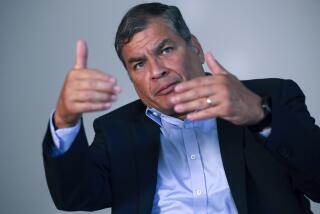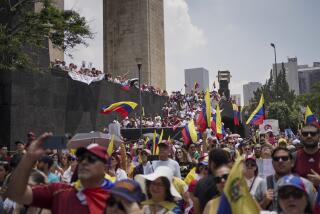Leftist rolling to victory in Ecuadorâs presidential race
QUITO, ECUADOR â In a potential blow to already-weakened U.S. influence in Latin America, leftist economist Rafael Correa appeared to be sweeping to victory Sunday in Ecuadorâs presidential election.
A native of Guayaquil, Correa received about 65% of the vote, overpowering banana magnate and perennial candidate Alvaro Noboa, who garnered 35%, according to an official count of 20% of the ballots cast. Full results wonât be known until today or Tuesday. Noboa has not conceded.
Correa, 43, a career academic with a doctorate in economics from the University of Illinois, has promised to pursue a socialist agenda similar to that of his political mentor, Venezuelan President Hugo Chavez.
Like Chavez, he has pledged to make sweeping changes to his nationâs corrupt and inefficient political system by convening a new constitutional assembly and concentrating power in the presidency.
âAfter years of living in the darkness, we have a triumph that is a victory for hope -- hope for change, hope for regaining control of the homeland,â Correa said in a speech to supporters at a downtown hotel here. âWe are nothing but the instruments of hope.â
Probably less hopeful are holders of Ecuadorâs foreign debt, which totals about $11 billion. During his campaign, Correa said he would try to renegotiate the obligations and did not rule out defaulting, saying the money would be better spent on social programs.
Ecuador has defaulted on its foreign debt three times since the early 1980s.
âHis comments were reason enough to cause a sell-off in Ecuadorean bonds,â said Gianfranco Bertozzi, an emerging-markets strategist at Lehman Bros. in New York. âThis was the least market-friendly result. Most investors thought Noboa would win.â
Correa would be the fifth left-leaning presidential candidate to be elected in Latin America in a little more than a year. Leftists are in power, or are set to take office, in Bolivia, Chile, Brazil, Nicaragua and Ecuador. Venezuela is also governed by a leftist, Chavez.
But not all are opposed to U.S. economic policies.
Throughout his campaign, Correa spoke harshly about the United States and President Bush. But since placing second to Noboa in the first electoral round on Oct. 15, he has softened his stance, and recently had a friendly meeting here with U.S. Ambassador Linda Jewell.
On Sunday, though, he reiterated a promise that he would not renew the U.S. militaryâs lease on part of the Manta air base, the headquarters for U.S. efforts to curb drug trafficking in the region. He also said he would not sign a proposed free-trade agreement with the United States.
Like Chavez in Venezuela, Correa has proposed to bypass Congress on issues such as the budget and political reform to better carry out the âwill of the people.â
Chavez, who leads in polls for a Dec. 3 election, made similar changes through a constitutional assembly after taking office in 1999. Critics fear that Correa will use such changes to consolidate power.
Correaâs supporters, who come from a broad cross section, said they voted for him because of his youth, idealism and his promise to reinvent Ecuador, a politically restive country that has had seven presidents in 10 years.
âHe has a social conscience,â said electrical engineer Jorge Quirola, interviewed at a polling station in the middle-class suburb of Cumbaya. âHeâs more believable, while having Noboa as president would be going down the same road as always.â
Correaâs chances of carrying out the changes he has promised would be complicated by his lack of support in Ecuadorâs newly elected Congress, which would have to authorize a constitutional assembly or referendum to make the changes Correa wants.
Correa has threatened to dissolve Congress.
âHe canât govern with the same radical approach with which he conducted his campaign,â said Maria de la Paz Vela, an economist at the Multiplica consulting firm here. âHe will have to moderate his positions.â
Political analyst Vicente Albornoz said that Correa might resort to ruling from the streets. âConflict and violence may be the only weapons he has,â he said.
Noboa favored good relations and a free-trade agreement with the United States. But he proved a poor candidate after his first-place showing in the first round, alienating voters with a Bible-thumping campaign in which he frequently prayed for God to grant him victory in the cause of âjobs, housing, stability and anti-communism.â
Many voters doubted that Noboa could deliver on promises to provide monthly stipends for the poor and more housing.
Analysts said a victory by Correa, more than anything, would show a profound desire for change in one of the Western Hemisphereâs most unstable countries.
âWe need a person who will transform Ecuador, someone young and energetic who got where he did on his own account, not by inheriting a banana plantation,â said dentist Jorge Raza, after voting in Quitoâs blue-collar Luloncoto neighborhood.
More to Read
Sign up for Essential California
The most important California stories and recommendations in your inbox every morning.
You may occasionally receive promotional content from the Los Angeles Times.










